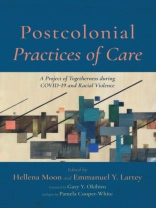This anthology seeks to theorize a method of a radical, decolonial spiritual-care paradigm that can chart a new course in defining–or reframing–what is ‘spiritual, ‘ what is theological, and what is ‘care.’ Postcolonial Practices of Care presents voices of educators, chaplains, students, human-rights and disability activists, and other professionals to highlight the problems of disciplinary divides and binaries–such as pastoral/spiritual or ordinary/sacred. In focusing on the practices of care during the pandemic, the editors see their book as contributing to ongoing paradigm shifts and the importance of decoloniality as a method in the field of pastoral care.
The praxis of spiritual care addresses–and interrogates–the history of spiritual violence and its imbrication with modernity/coloniality, colonialism, racial capitalism, neoliberalism, and (conscious and unconscious) white Christian supremacy that constructed not only the pastoral and the spiritual but also its divide: the pastoral/spiritual. Such a framework focuses on ‘religious’ difference without probing or critiquing how those differences have reified hierarchies of superiority or sustained ideologies of Euro-centric monocultural ethnocentrism. We want to emphasize the shared practices that bring us together as human beings on Earth rather than to prove we are better, or more unique, than one another.
A propos de l’auteur
Pamela Cooper-White is a scholar, teacher, and Episcopal priest whose work integrates pastoral theology with relational psychoanalysis. She teaches as the Ben G. and Nancye Clapp Gautier Professor of Pastoral Theology, Care and Counseling at Columbia Theological Seminary, Decatur, GA, and is also Co-Director of the Atlanta Theological Association’s Th D program in Pastoral Counseling. She was awarded a Fulbright fellowship as the 2013-14 Fulbright-Freud Visiting Scholar of Psychoanalysis in Vienna, Austria, where she conducted research on early psychoanalysis and religion at the Sigmund Freud Museum, and taught a seminar on Freud, Psychoanalysis and Religion at the University of Vienna. She holds two Ph Ds: from Harvard University (in historical musicology), and from the Institute for Clinical Social Work, Chicago (a psychoanalytic clinical and research degree). Cooper-White is the author of Braided Selves: Collected Essays on Multiplicity, God, and Persons (Cascade Books, 2011), Many Voices: Pastoral Psychotherapy and Theology in Relational Perspective (2007), Shared Wisdom: Use of the Self in Pastoral Care and Counseling (2004), The Cry of Tamar: Violence Against Women and the Church’s Response (1995; 2nd revised edition 2012), and Schoenberg and the God Idea: The Opera ‘Moses und Aron’ (1985). She has published numerous articles and anthology chapters, and has lectured frequently across the U.S., as well as in Vienna, Budapest, Bern, and Prague. Cooper-White is a clinical Fellow in the American Association of Pastoral Counselors, a Licensed Clinical Professional Counselor in Illinois, and a Board Certified Counselor, National Board for Certified Counselors. She serves on the Steering Committee of the Psychology, Culture, and Religion Group of the American Academy of Religion, and the Editorial Board of the Journal of Pastoral Theology.







![Couverture du Brian Schrag & Julisa Rowe: Community Arts for God's Purposes [Chinese] 貼近神心意的社群藝術 Couverture du Brian Schrag & Julisa Rowe: Community Arts for God's Purposes [Chinese] 貼近神心意的社群藝術](https://static.worldofdigitals.com/thumb_webp/740/9781645083740.webp)




